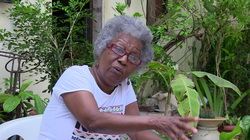
Makota Valdina Pinto
Makota Valdina Pinto was an esteemed ritual elder in her terreiro (temple) and in the wider Candomblé community until her untimely passing in 2019. "Makota", as friends called her, was a proud practitioner of the Angolan tradition of Candomblé, unlike many others of the Yoruban lineage. A lifelong educator, she was a passionate voice on socio-environmental issues and a respected counsel to the City of Salvador. Makota Valdina possessed a wealth of knowledge about sacred and medicinal plants, wisdom she loved to share with youth in her community. Makota Valdina was a founder and organizer of an ongoing annual demonstration for peace and against religious intolerance.
Makota Valdina Pinto was an esteemed ritual elder in her terreiro (temple) and in the wider Candomblé community until her untimely passing in 2019. "Makota", as friends called her, was a proud practitioner of the Angolan tradition of Candomblé, unlike many others of the Yoruban lineage. A lifelong educator, she was a passionate voice on socio-environmental issues and a respected counsel to the City of Salvador. Makota Valdina possessed a wealth of knowledge about sacred and medicinal plants, wisdom she loved to share with youth in her community. Makota Valdina was a founder and organizer of an ongoing annual demonstration for peace and against religious intolerance.
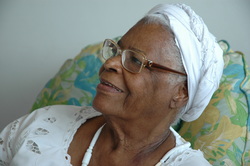
Mãe Stella de Oxóssi
Mãe Stella de Oxóssi transitioned to the ancestral realm in December 2018. She was probably the most well known Candomblé leader in Brazil. Her terreiro, known as Ilê Axé Opô Afonjá, functions as a village, with a museum, weaving center and a municipal school for the community's children. It is officially recognized as part of Brazil's cultural heritage. Axé, as the terreiro is known, prioritizes ecological sustainability. Mãe Stella was among the first leaders to insist that offerings during the annual popular Festa de Yemanjá be fully biodegradable. Author of several notable publications, including a weekly newspaper column disseminating the values and wisdom of Candomblé, Mãe Stella also authored the children’s book, Terra Viva (Earth Alive) linking the legends of Candomblé's Orixás (deities) with urgent environmental concerns. She was the first woman Candomblé leader inducted into Bahia's esteemed Academy of Literature.
Mãe Stella de Oxóssi transitioned to the ancestral realm in December 2018. She was probably the most well known Candomblé leader in Brazil. Her terreiro, known as Ilê Axé Opô Afonjá, functions as a village, with a museum, weaving center and a municipal school for the community's children. It is officially recognized as part of Brazil's cultural heritage. Axé, as the terreiro is known, prioritizes ecological sustainability. Mãe Stella was among the first leaders to insist that offerings during the annual popular Festa de Yemanjá be fully biodegradable. Author of several notable publications, including a weekly newspaper column disseminating the values and wisdom of Candomblé, Mãe Stella also authored the children’s book, Terra Viva (Earth Alive) linking the legends of Candomblé's Orixás (deities) with urgent environmental concerns. She was the first woman Candomblé leader inducted into Bahia's esteemed Academy of Literature.
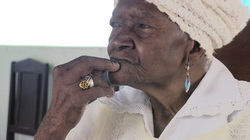
Mãe Filhinha
Mãe Filhinha transitioned from this earthly life at the age of 110, after decades of leading her temple, the Casa de Iemanjá terreiro in the historic town of Cachoeira in the fertile region of the Recôncavo Bahiano. A tremendous source of pride for her community, Mãe Filhinha was at the helm of her terreiro's sacred rituals until early 2014. Until her final year, this amazing matriarch actively participated in annual ceremonies, processions, and festivities of the Irmandade da Boa Morte (Sisterhood of the Good Death), a society formed before abolition to buy the freedom of female slaves. Mãe Filhinha's father was enslaved, of which she speaks in our film.
Mãe Filhinha transitioned from this earthly life at the age of 110, after decades of leading her temple, the Casa de Iemanjá terreiro in the historic town of Cachoeira in the fertile region of the Recôncavo Bahiano. A tremendous source of pride for her community, Mãe Filhinha was at the helm of her terreiro's sacred rituals until early 2014. Until her final year, this amazing matriarch actively participated in annual ceremonies, processions, and festivities of the Irmandade da Boa Morte (Sisterhood of the Good Death), a society formed before abolition to buy the freedom of female slaves. Mãe Filhinha's father was enslaved, of which she speaks in our film.
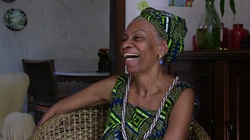
Ekedy Sinha
Ekedy Sinha is an esteemed leader at the Casa Branca, Brazil’s oldest organized Candomblé terreiro. She is also a widely recognized leader in Salvador’s social movements, including the Carta das Aguas water campaign. To combat racism in public health care, Ekedy founded an annual health fair where the Candomblé community shares traditional medicinal and cultural wisdom with "western" health practitioners, who simultaneously offer on-site screenings for diabetes and blood pressure. Now official public policy, many other terreiros hold similar inclusive health fair events.
Ekedy Sinha is an esteemed leader at the Casa Branca, Brazil’s oldest organized Candomblé terreiro. She is also a widely recognized leader in Salvador’s social movements, including the Carta das Aguas water campaign. To combat racism in public health care, Ekedy founded an annual health fair where the Candomblé community shares traditional medicinal and cultural wisdom with "western" health practitioners, who simultaneously offer on-site screenings for diabetes and blood pressure. Now official public policy, many other terreiros hold similar inclusive health fair events.
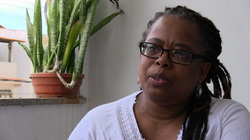
Denize Ribeiro, PhD
Denize is a professor at UFBA, Federal University of Bahia Recôncavo and distinguished member of the Casa Branca terreiro community. Denize was President of Bahia's Rede de Mulheres dos Terreiros (Women's Terreiro Network). A former public health care professional, she is a persuasive and prolific speaker at conferences whose discourse focuses on combatting socially-entrenched racism, sexism, and religious intolerance, and on preserving Candomblé’s traditional ways. Denize recently welcomed our film's narrator Alice Walker for a bilingual presentation in a UFBA conference about health and arts in the African Diaspora. Both women were delighted to come together virtually and hope to meet in person after the pandemic.
Denize is a professor at UFBA, Federal University of Bahia Recôncavo and distinguished member of the Casa Branca terreiro community. Denize was President of Bahia's Rede de Mulheres dos Terreiros (Women's Terreiro Network). A former public health care professional, she is a persuasive and prolific speaker at conferences whose discourse focuses on combatting socially-entrenched racism, sexism, and religious intolerance, and on preserving Candomblé’s traditional ways. Denize recently welcomed our film's narrator Alice Walker for a bilingual presentation in a UFBA conference about health and arts in the African Diaspora. Both women were delighted to come together virtually and hope to meet in person after the pandemic.